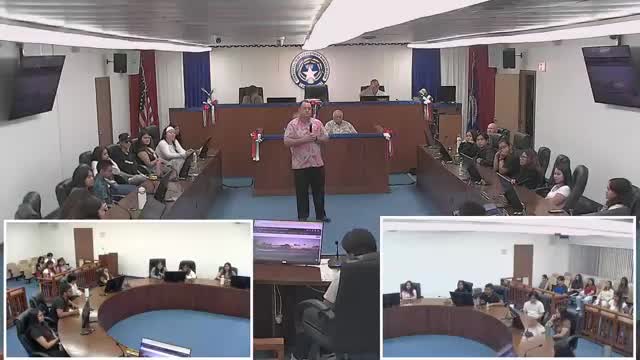House members and students discuss public-safety programs, DARE and local concerns about prostitution and substance abuse
Get AI-powered insights, summaries, and transcripts
Subscribe
Summary
Students raised concerns about prostitution, drugs and drunk driving; House members described past and potential public-safety programs, grant reliance, and leadership and funding challenges affecting program sustainability.
A group of students visiting the Northern Mariana Islands House of Representatives raised investigative findings about prostitution, drugs and drunk driving, and asked lawmakers how those issues are being addressed.
A student told representatives the class had pursued investigative reporting into "the obvious prostitution rings and other things going on within the CNMI," and asked for lawmakers’ thoughts on possible direct responses. The student asked whether the government could do more public education or direct interventions.
Representative Blas "BJ" Atau and other House members acknowledged those concerns and discussed public-safety programming. Members described past programs such as DARE, which they said had provided youth outreach and prevention education, and noted that DARE had waned in the commonwealth when leadership, funding priorities and grant administration shifted.
"We relied so much on external [grants]," Atau said, referring to federal and other external funding streams. He and other members said grant-funded programs can collapse if leadership does not maintain consistent messaging and follow-through.
House floor leader Marissa Flores and committee members said grants often came through the local Criminal Justice Planning Agency (C J P A), and that sustaining programs required steady leadership, careful use of grant funds and coordination with agencies such as the Department of Public Safety. Flores said appointing qualified leaders and ensuring confirmation and oversight were essential to keep programs operating.
Chairman O'Don (identified in the transcript with that name) framed the issue around funding and priorities, telling students that many programs fail when agencies do not use funding for their intended purposes. He urged civic engagement and argued that long-term sustainability requires accountable leadership and prioritization of limited government resources.
Representatives and staff discussed DUI enforcement as an example where efforts had produced measurable reductions; they suggested that combining enforcement, public education and grant-supported programs could be part of a broader approach to curb prostitution-related harms, substance abuse and impaired driving. No new grants, ordinances or enforcement actions were proposed or voted on during the classroom session.
